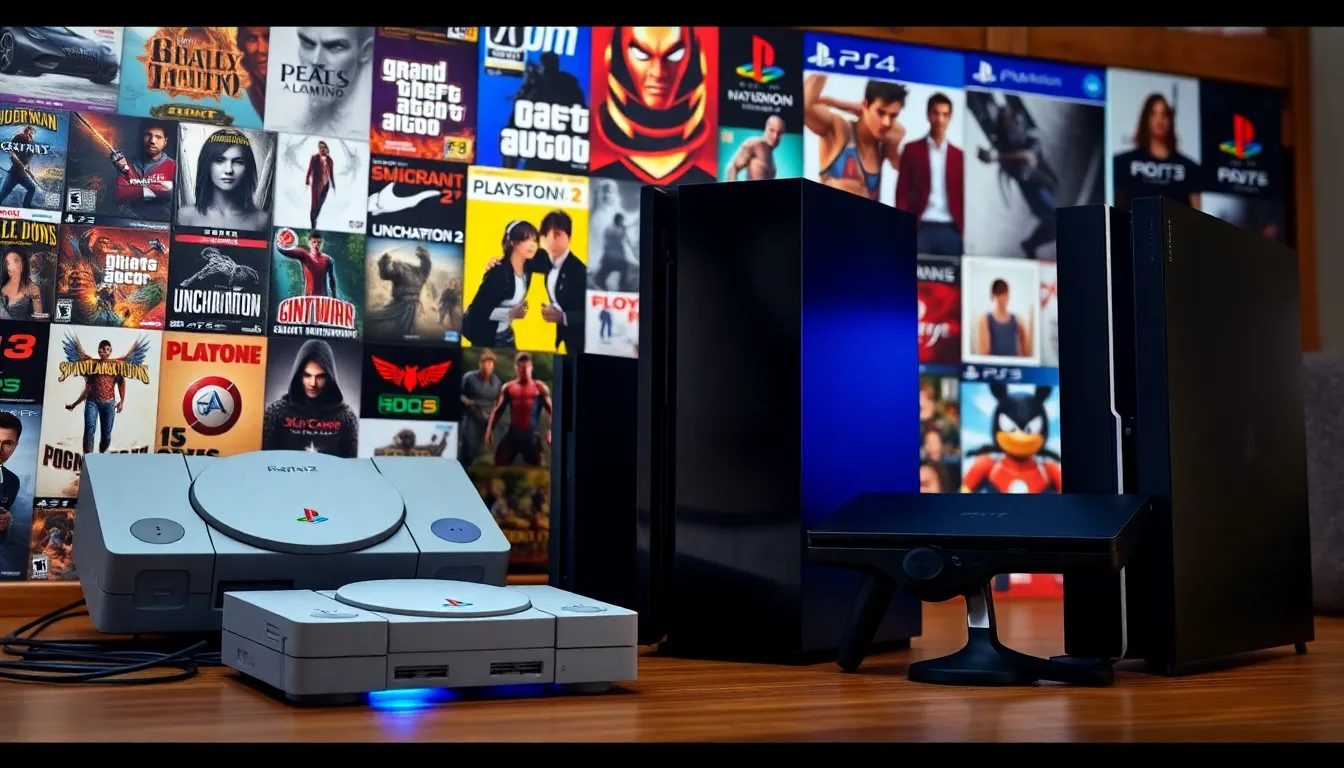In the ever-evolving landscape of video gaming, one console has captured the hearts and minds of players more than any other: the PlayStation. Since its inception, Sony’s flagship gaming system has not only changed how games are played but has also significantly influenced the entire gaming culture. This article explores the evolution of PlayStation consoles, the innovations of the latest models, the importance of exclusives, memorable gaming moments, community dynamics, and future trends in this beloved gaming ecosystem.
Table of Contents
ToggleThe Evolution of PlayStation Consoles

PlayStation 1: The Game Changer
Released in December 1994, the PlayStation 1 ushered in a new era of gaming. Unlike its competitors, it utilized CDs instead of cartridges, offering game designers vast storage potential for graphics and audio. Titles like “Final Fantasy VII” and “Metal Gear Solid” not only showcased impressive storytelling and cinematic experiences but also made gaming accessible to a broader audience. The PlayStation 1 set the standard for what a gaming console could achieve and initiated the rapid evolution of gaming graphics and gameplay mechanics.
PlayStation 2: The Cultural Phenomenon
The PlayStation 2, launched in 2000, achieved a level of success that few gaming systems could rival, selling over 155 million units worldwide. It combined cutting-edge hardware with the ability to play DVDs, making it a coveted addition to households. Iconic games such as “Grand Theft Auto: San Andreas” and “God of War” propelled the console into a cultural movement, cementing PlayStation’s status as a household name. Its extensive library of titles catered to all demographics, offering something for every type of gamer.
PlayStation 3 and the HD Era
The PlayStation 3, released in 2006, marked the transition into high-definition gaming. With its powerful Cell processor and the introduction of the PlayStation Network, the console allowed gamers to play online, access digital content, and engage in a more connected gaming experience. Even though an initial rocky launch due to its price point, the PS3 eventually flourished with a strong lineup of exclusives, including “The Last of Us” and “Uncharted 2: Among Thieves,” establishing itself as a significant player in the console war.
The Leap to PlayStation 4
Launched in November 2013, the PlayStation 4 was designed with gaming at its core, emphasizing social connectivity and user-friendly interfaces. Its powerful hardware enabled stunning graphics and realistic gameplay experiences. The platform became synonymous with critically acclaimed games like “Bloodborne” and “Spider-Man.” Besides, the PS4’s user interface and system capabilities laid the groundwork for the future of interactive entertainment, making it a leader in the eighth generation of gaming consoles.
Innovations of PlayStation 5
The PlayStation 5, released in November 2020, introduced groundbreaking features that set new benchmarks for gaming consoles. With its innovative DualSense controller, players experience heightened immersion through haptic feedback and adaptive triggers that respond dynamically to gameplay. This technology allows for a more engaging experience, making players feel every action as they progress through a game.
Also, the PS5’s ultra-high-speed SSD significantly reduces loading times, creating a seamless gaming experience. Coupled with stunning graphics powered by ray tracing, the console is capable of rendering lifelike environments in 4K resolution.
The PS5 also embraces backward compatibility, allowing players to enjoy a vast library of PS4 games. Also, the design of the console itself, with its striking white and black aesthetic, has sparked a new conversation about modern tech aesthetics.
The Impact of PlayStation Exclusives
PlayStation exclusives have played an instrumental role in the console’s success, creating dedicated fanbases and driving system sales. Titles such as “God of War,” “Horizon Zero Dawn,” and “Demon’s Souls” not only showcase the technical prowess of the PlayStation but also highlight unique storytelling that resonates deeply with players.
The exclusivity of major franchises fosters a culture of anticipation and excitement, as fans eagerly await the release of new entries. These games often push the boundaries of storytelling, gameplay mechanics, and technical capabilities, reinforcing PlayStation’s image as an innovator in the gaming industry.
Through exclusive titles, PlayStation has succeeded in crafting a distinctive identity, providing gamers with rich experiences that cannot be found on other platforms.
Memorable Moments in Gaming History
Throughout its history, PlayStation has been the backdrop for some of gaming’s most unforgettable moments. From defeating iconic bosses to emotional storylines that tug at the heartstrings, the medium has seen players experience joy, triumph, and heartache.
Consider the emotional weight of playing through “The Last of Us,” where the narrative intricately weaves themes of loss and survival. Or the exhilaration experienced while swinging through New York City as Spider-Man. These moments become ingrained in the memory of players, making them feel a part of something larger than just a game.
In many ways, these memorable moments shape the way gamers perceive stories and character development, advancing the narrative structure of video games overall.
Community and Online Gaming Culture
The advent of online gaming has revolutionized how players interact and engage with each other. PlayStation’s commitment to fostering a community experience is evident through its PlayStation Network, which enables players to connect, compete, and collaborate across the globe.
Platforms like PlayStation Plus offer subscribers access to free monthly games and exclusive features, building a sense of community among members. Also, online multiplayer games such as “Call of Duty” and “Fortnite” create vibrant ecosystems where players share experiences, strategies, and friendships.
The evolution of gaming communities has transformed the landscape, highlighting the importance of social interaction within gaming, leading to the rise of online influencers and gaming content creators who share their experiences and expertise.
Future Trends in PlayStation Gaming
As technology advances, so does the potential for new gaming experiences. The future of PlayStation gaming appears to be leaning toward virtual reality (VR) and enhanced augmented reality (AR) experiences. The PlayStation VR headset has already shown promise, and ongoing innovations in VR technology will likely result in even more immersive gaming atmospheres.
Also, advancements in cloud gaming threaten to reshape the traditional console market. Services like PlayStation Now are paving the way for on-demand gaming, allowing players to access a library of games without the need for physical hardware.
Also, the integration of artificial intelligence could significantly impact game development, allowing for more sophisticated NPC behavior and adaptive difficulty levels that enhance player experience.
Conclusion
The PlayStation brand represents more than just a series of consoles: it embodies a culture of innovation, creativity, and connection among gamers. From its early days to the advanced technology of the PS5, PlayStation has continuously reshaped the gaming landscape through exclusive titles, community engagement, and groundbreaking innovations.
As the industry progresses, the future promises to be exciting, with new technologies on the horizon likely to revolutionize gameplay once again. For gamers, PlayStation will always be a beacon of adventure, community, and unforgettable experiences.




